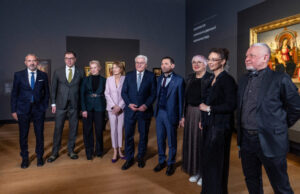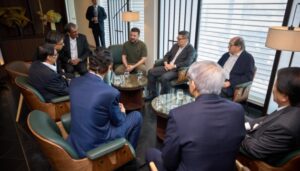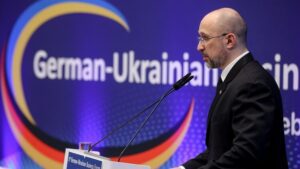
On January 23, the Berlin Gemäldegalerie hosted the grand opening of the exhibition “From Odesa to Berlin. European painting of the XVI-XIX centuries”. The exhibition includes 60 paintings from the collection of the Odesa Museum of Western and Oriental Art, as well as works from Berlin collections.
The ceremony was attended by Federal President of Germany Frank-Walter Steinmeier, Minister of Culture and Strategic Communications of Ukraine Mykola Tochytskyi, Federal Government Commissioner for Culture and Media, State Minister Claudia Roth, President of the Prussian Cultural Heritage Foundation Hermann Partzinger, Ambassador Extraordinary and Plenipotentiary of Ukraine to Germany Oleksiy Makeev.
In his speech,Frank-Walter Steinmeier emphasized that the exhibition demonstrates that Russia’s bloody war of aggression is also a war against Ukrainian culture and Ukrainian identity. At the same time, the exhibition emphasizes the courage and determination of Ukrainians in protecting their cultural heritage.
The German President emphasized the importance of the exhibits from the museum in Odesa, which were saved from Russian attacks and brought to Berlin. He called for continued support for Ukraine in its struggle for its culture and expressed hope for the paintings’ speedy return to independent Ukraine.
In turn, Mykola Tochytskyi expressed his gratitude to the German partners for supporting joint efforts to protect Ukraine’s cultural identity. He emphasized that Ukrainian culture is an integral part of European culture. At the same time, the patronage of the exhibition of masterpieces from the Odesa Museum of Western and Eastern Art is an important practical step in developing a cultural dialogue between Ukrainians and Germans.
“Joint cultural events help the German audience to get to know Ukrainian culture better, to see its vulnerability in the face of Russian aggression and to understand why it is so important to protect it,” the Minister emphasized. “Russians can destroy a museum and a building, but they cannot erase cultural memory. The barbaric attack on Ukrainian culture is an attack on Europe.”
As a reminder, after Russia’s full-scale invasion of Ukraine on February 24, 2022, the staff of the Museum of Western and Eastern Art in Odesa evacuated the most valuable paintings to a safe place. In September 2023, 74 works of art were delivered to the German capital, and in February 2024, about a dozen paintings became part of an exhibition at an art gallery in Berlin. Now visitors will have the opportunity to see another 60 paintings from the Odesa museum. Among them are works by Francesco Granacci, a representative of the Florentine school, Rulant Saverey, a master of etching and an outstanding artist from the golden age of Dutch painting, as well as the German landscape painter Andreas Achenbach.
Exhibition “From Odesa to Berlin” opens in Berlin under the patronage of the President of GermanyThe project is implemented under the patronage of the President of the Federal Republic of Germany Frank-Walter Steinmeier and with the support of the Federal Government Commissioner for Culture and Media Claudia Roth.
Theexhibition at the Berlin Art Gallery will run until June 22, 2025.

A map of international partnerships of Ukrainian cities and towns was presented at the International Conference on Ukraine’s Recovery, which is taking place in Germany on June 11-12, Kyiv Mayor Vitali Klitschko said.
“During the International Conference on the reconstruction of Ukraine presented a map of international partnerships of Ukrainian cities and towns. The database was prepared by the Association of Ukrainian Cities together with the Council of European Municipalities and Regions,” he wrote in his Telegram channel on Wednesday.
Klitschko noted that now only a third of Ukrainian communities have partners in other countries, of which 200 – among municipalities in Germany.
“Today at the conference discussed the further development of such cooperation. Because, as our partners emphasize, it is the cooperation of cities, strengthening local self-government is key to strengthening European democracy. And also – for the future reconstruction of Ukraine,” – wrote Klitschko.
https://interfax.com.ua/news/regions/993178.html

On the sidelines of the Shangri-La Dialogue summit, President of Ukraine Volodymyr Zelenskyy met with the heads of leading Singaporean investment companies, the press service of the Ukrainian president reports.
“The event was attended by the heads of Singapore’s sovereign wealth fund GIC, Temasek Holdings, Wilmar International, the Singapore Business Federation, Blackstone Singapore, telecommunications operator SingTel, Universal Success Enterprises, and construction company Meinhardt Group,” the statement said.
During the meeting, Zelensky emphasized that the Ukrainian economy, even in difficult conditions of war, finds ways to develop and grow, adapting to new circumstances.
In addition, Zelenskyy expressed gratitude to Singaporean businessmen who continue to work in Ukraine and keep their jobs.
The President also emphasized that there is great potential for further development of Ukrainian-Singaporean trade cooperation, especially in the field of technology and innovation.
Zelenskyy also reaffirmed Ukraine’s commitment to creating additional attractive incentives for investors.
“The Head of State invited Singaporean investors to take part in a joint conference with the EU on the restoration, reform and modernization of the Ukrainian economy to be held in Berlin. A program for mobilizing international financial support, implementing long-term projects and creating attractive conditions for investing in Ukraine’s economy will be presented there,” the statement said.

Nova Post Group has launched its first Nova Post branch in the German capital, Berlin, a press release said Friday.
“We further plan to enter new markets and develop the network in those countries where we are already present, because we seek to logistically connect Ukraine to the world, and in time to connect all countries to each other,” said Nova Post co-owner Vladimir Popershnyuk, co-owner of Novaya Posta.
The company plans to open branches in Hamburg, Frankfurt am Main, Munich and Cologne by the end of the year.
According to the message of “Novaya Pochta” the delivery to Germany will be done in five days and the cost of the parcel will be defined according to the scheme: the parcel up to 1 kg – 250 UAH, up to 2 kg – 400 UAH, up to 10 kg – 600 UAH, and the parcel up to 30 kg – 1,2 thousand UAH.
In the first branch in Berlin private clients and business can receive and send parcels up to 100 kg, it is open from Monday to Saturday.
As it was reported, “Nova Posta” already works in Poland, Lithuania, Czech Republic, Moldova and Romania.
Founded in 2001, Nova Posta now has more than 6 thousand branches in Ukraine. It provides a full range of logistics and related services.
The GC includes Ukrainian and foreign companies, such as Nova Posta, NP Logistic, NovaPay payment system and Nova Posta Global.

One of Europe’s largest bus operators FlixBus announced the launch of a new international line from Ukraine starting February 14: Kiev – Berlin – Hamburg – Bremen and extension of the existing one from Warsaw-Lublin to Odessa, the company’s press service said Thursday.
“Today we are taking the next step in developing lines from Ukraine to Germany and Poland. Warsaw, Berlin and Hamburg are top destinations for travelers. Demand proves that Ukrainians care about these destinations,” commented FlixBus director for Ukraine, Poland and the Baltics Michal Lehmann.
He noted that in spite of the war, the company has doubled the size of the route network from Ukraine during the year and plans to open new lines if it sees that people need transportation services.
According to the message tickets for flights N3206 Kyiv – Zhytomyr – Rivne – Lviv – Berlin – Hamburg – Bremen and N3242 Odessa – Uman – Vinnitsa – Khmelnytskyi- Lviv – Lublin – Warsaw are available at the site, in mobile application FlixBus and at partner agencies.
The route Odessa-Warsaw is presented on the current line, on which the bus departed from Vinnitsa. Given the high demand in the south of the country, it was decided to extend the line to include Uman and Odessa. Flights are daily. The bus will be on the road for about a day.
From Kiev to Germany the buses will go three times a week: on Tuesday, Friday and Saturday. From Bremen to Ukraine the bus departs on Monday, Thursday and Sunday. Travel time is about 30 hours, including stops and border crossing time.
As reported, after the start of a full-scale war, FlixBus launched 8 new routes from Ukraine to Europe. The company already has 16 lines from Ukraine to six European countries: Germany, Poland, Czech Republic, Hungary, Slovakia and Austria.
FlixBus, which develops bus transportation in Europe and the U.S., was founded in 2013. It operates on a partnership model with regional bus carriers that provide their buses and route documents.
In June 2019, FlixBus announced the opening of a representative office in Ukraine, in July 2020 the company launched domestic flights in the country.

Prime Minister Denys Shmyhal is on a working visit to the German capital Berlin.
“We are working today in Berlin, we have a busy agenda. We started it with the opening of the 5th Ukrainian-German Economic Forum with Chancellor Olaf Scholz,” Shmygal wrote on his Telegram channel.
According to him, during his speech, he focused on the prospects that will open up for European business in the process of implementing the Ukraine Recovery Plan.
In particular, we are talking about the military-industrial complex.
“We aim to create a high-tech military-industrial complex, in particular, thanks to the transfer of European and world military technologies, attracting investment in design development and building military production,” he wrote.
Also, the prime minister said at the forum that the country has a significant potential for the supply of “clean” energy and Europe’s largest gas storage facilities.
“Digital technologies. In the future, Ukraine can turn into a digital hub of Asian and European backbone Internet traffic. The agricultural sector, whose investment potential is at least $34 billion. Green Deal. We see ourselves as a climate modernized state. European investment in pure Ukrainian production is a step to the implementation of the green transition,” Shmyhal said.